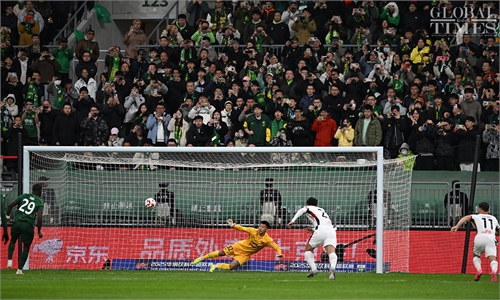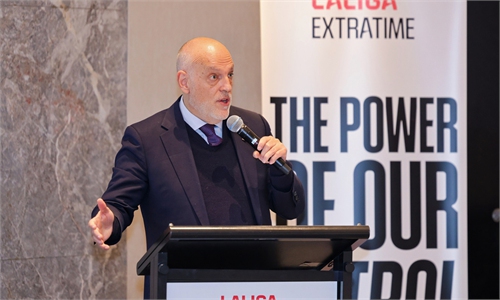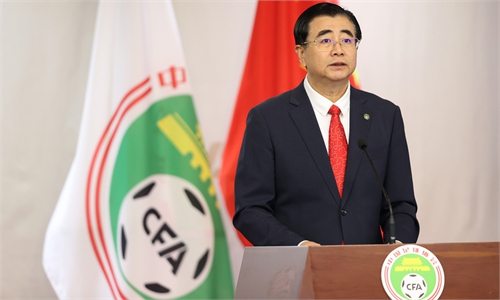SPORT / FOOTBALL
German football clubs welcome mutual learning with Chinese youth players
Games transcend boundaries
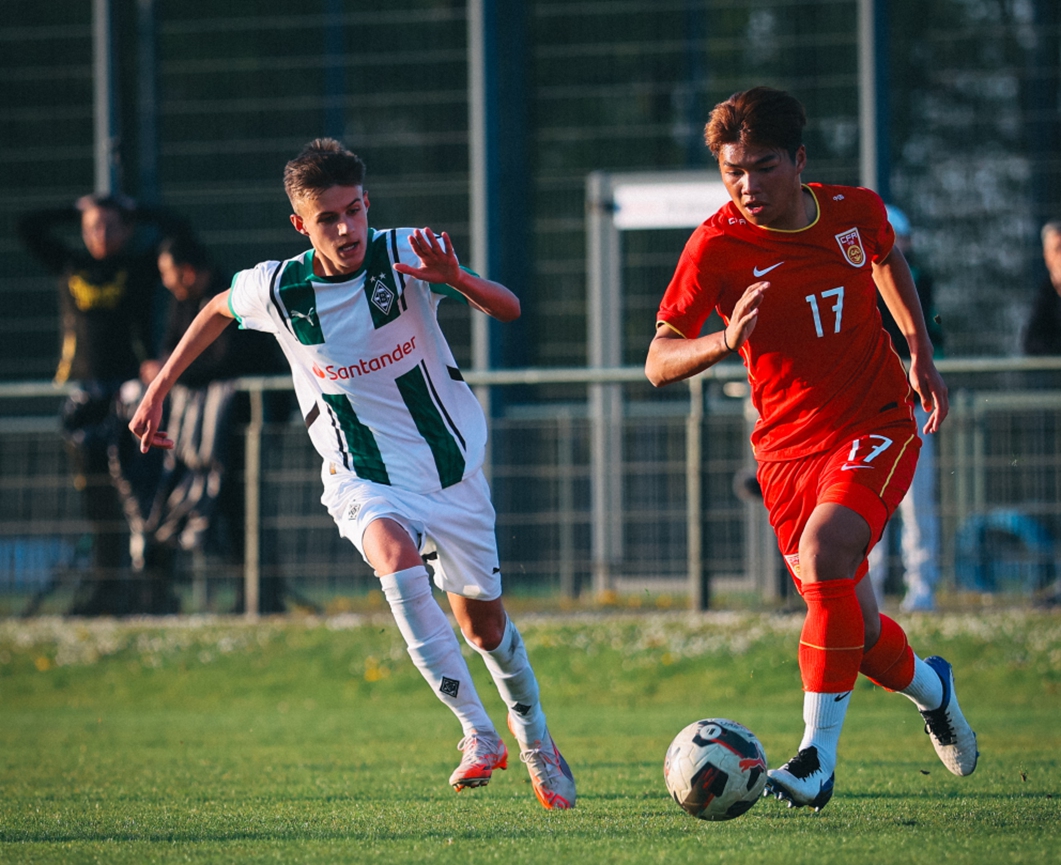
Chinese under-16 player Lu Qizheng dribbles against a Borussia M?nchengladbach player. Photo: Courtesy of Bundesliga
Developing Chinese youth football has become a priority for Chinese football authorities, as one of the recent highlights includes the Chinese national under-16 team having training sessions with German Bundesliga clubs in April.
In mid-April, the Chinese U16 national team traveled to Germany for training and successively passed the tests from two Bundesliga U16 teams as they defeated the VfL Wolfsburg U16 team 3-1 and the Borussia Moenchengladbach U16 team 1-0.
Senior executives from German football clubs Mönchengladbach, Borussia Dortmund, and Wolfsburg said these partnerships are founded on equality and reciprocal learning.
It is not the first time a Chinese national under-16 team has taken on German clubs. Last year, the then-U16 Chinese team was thrashed by the "Die Fohlen" Moenchengladbach team with 8-0.
"It's always very exciting to get in touch with other teams of other countries," Markus Aretz, managing director of Borussia Moenchengladbach, told the Global Times during a recent roundtable interview with Chinese journalists.
"It is also an interesting experience for our team as they lost the game to a team that they barely know but who can play football like they do," he added.
Moenchengladbach, known for its quality talent cultivating system which has produced players such as Marc-André ter Stegen, is the only club in the German top-tier league that has hosted the Chinese U16 team twice in the Bundesliga Dream project that is endorsed by the Chinese Football Association (CFA) and Bundesliga.
Aretz noted that having such exchanges is also beneficial to both sides on the coaching level.
"It's good for our youth coaches, to get in touch with coaches from China, to answer their questions and to help them. This partnership should always help you to become more informed about what you're doing," he said.
Carsten Cramer, Managing Director of Borussia Dortmund, echoed this sentiment of reciprocal beneficiary.
"We are convinced that we can tell the story of Dortmund to the Chinese without becoming a teacher. You have experiences, you are a very successful and ambitious country," said Cramer, as his club Dortmund has established several football academies in China. "In this case of football, Dortmund could be a good coaching partner," Cramer said.
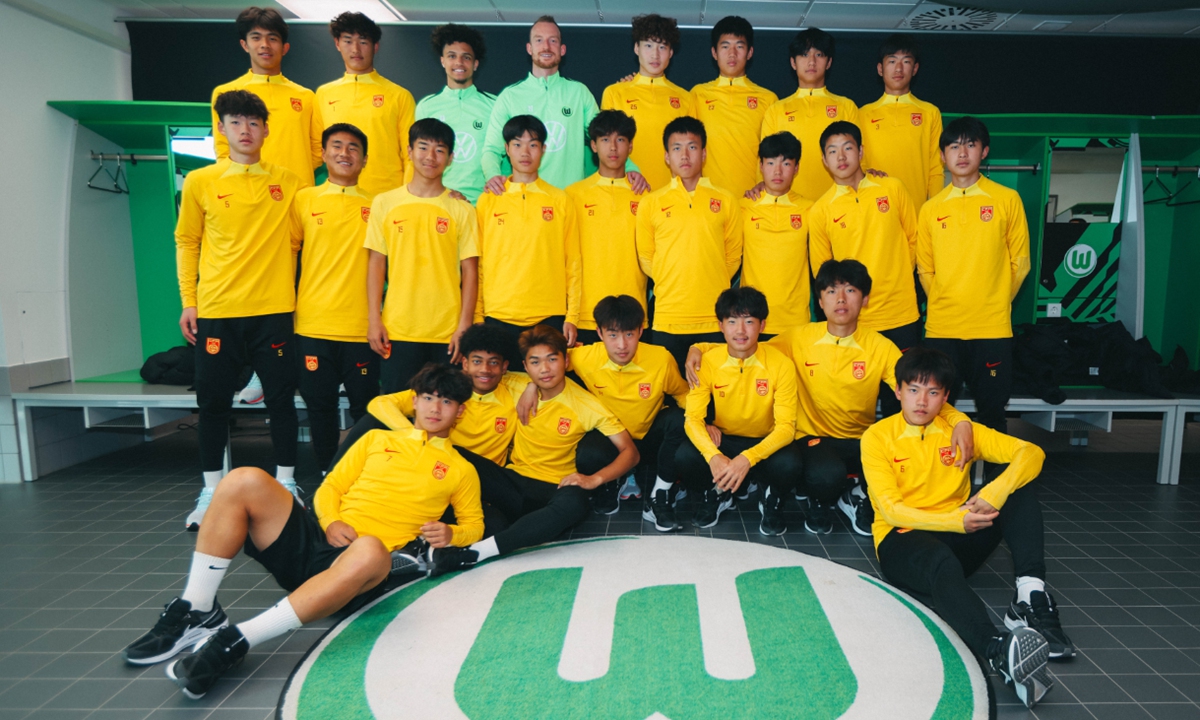
Chinese U16 team players pose for a photo with VfL Wolfsburg team captain Maximilian Arnold (fourth from left in the third row) and player Kevin Paredes. Photo: Courtesy of Bundesliga
The Bundesliga's robust fan engagement - 94 percent average stadium occupancy, 3.1 goals per match - and its history of integrating Asian talents make it an ideal development platform.
As China intensifies its youth focus, such cooperation could pave the way for future Chinese stars in Europe and for German clubs to tap into new talent pools and markets.
Michael Meeske, managing director of Wolfsburg, underscored the importance of sporting merit over market-driven decisions.
Wolfsburg previously signed Chinese player Zhang Xizhe in 2015, but he turned out with zero appearances in the Bundesliga due to fierce competition.
"We had a former player from China but it was when the team was a top team at that time. It was really difficult for him to find his place in the team, so mostly on the bench and that was also not enough to create the ultimate next step for us in terms of marketing presence in China," Meeske said.
They are now focused on nurturing Chinese talent at an early age. One such player is Jiang Jingqi who is seeking his path with Wolfsburg's U16 squad.
"Every club and big brand across Europe knows that if they can bring the first Chinese player to the first team squad it will be massive," he said.
Bundesliga is often considered a base for Asian players to play in Europe, as it has featured players such as Son Heung-min of South Korea and Shinji Kagawa of Japan before they moved to other European high-profile clubs.
Though currently no Chinese player is playing in the Bundesliga, historically, Yang Chen of Eintracht Frankfurt from 1998 to 2001, Shao Jiayi of 1860 Munich from 2002 to 2004, Energie Cottbus from 2006 to 2009, and Hao Junmin of Schalke 04 from 2009 to 2011 are the only Chinese players to have appeared in the Bundesliga.
Aretz acknowledged China's football gap but expressed optimism.
"China has to work on closing this gap in the sporting fields of football. The sporting side is the decisive side," he said.
"You won't sign a player just for marketing reasons. So we watch how Chinese football is developing and I think it would be very important to have Chinese players playing in Europe for their development too."
Cramer, representing a club with an average home attandance of over 80,000 people, stressed that Dortmund's unique approach in youth football could bear fruit in China.
"We are 100 percent committed to China because we know that you guys are crazy about sports. We know that there is a growing interest in football," Cramer said.
On top of the sporting cooperation, Dortmund has also joined hands with a Chinese company to have the roofs of its Westfalenstadion solar-paneled.
"I am convinced that the many football academies we established in China are no coincidence because you have so many kids who love to play football," he said, before noting football could be a unifying force.
"Football is a door opener. We are able to connect people even in difficult times through sports," he said.
